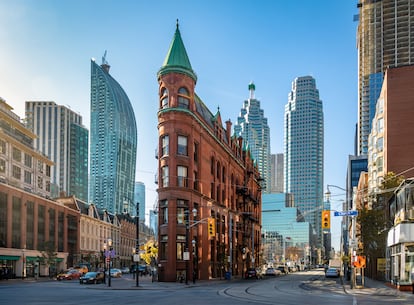Canada seeks to burst real estate bubble by banning foreign property purchases
Justin Trudeau’s government has proposed a two-year moratorium on foreign buyers to lower house prices but experts doubt the measure will have the desired effect


Canada’s housing market is facing a crisis. The problems facing a sector that gives a majority of Canadians a headache were laid bare in the federal budget presented in the lower house on April 7. The government of Justin Trudeau has introduced certain measures to tackle the issue, such as preventing foreigners from buying property for a period of two years.
According to the Canadian Real Estate Association (CREA), the average price of a home in Canada in February stood at $816,720 Canadian dollars (€598,000). CREA, which has a membership of around 130,000 real estate agents, that figure is 20.6% higher than in the same month in 2021. The national average cost of a home is reduced by $178,000 outside of Vancouver and Toronto, the two most active and most expensive real estate markets in the country.
That average rose by 44% in Canada between December 2019 and February 2022. Assistant Professor in Urban Planning at the University of Montréal, Jean-Philippe Meloche, says that this increase was already in evidence before Covid-19, but the pandemic brought the issue to the fore. “A lot of Canadians were carrying out renovations. At the same time, the construction sector was in need of manpower and materials that were not readily available. And a lot of people also bought properties outside the main urban centers. This exacerbated the problem.”
The Canadian government’s budget includes some $4 billion for the construction of at least 100,000 new homes over the next five years, double tax incentives for first-time buyers and monthly subsidies for people who are unable to find affordable rent. Taxes will also be raised on flipping: the sale of properties for profit after less than one year of ownership.
Finance Minister Chrystia Freeland said when presenting the budget: “Our economy is built by people, and people need homes in which to live. Our problem is simply this: Canada does not have enough homes. We need more of them, fast.” Also included in the budget is a ban on non-Canadians – and non-Canadian-held companies – from making property investment over the next 24 months. Exemptions will be put in place for permanent residents, asylum seekers and those holding work or study permits.
New Zealand introduced similar measures in August 2018. Similarly, foreigners are prevented from acquiring property in the Åland Islands in Finland. The debate about the presence of foreign buyers in the Canadian real estate market is not new: the provinces of British Columbia and Ontario already have a 20% tax rate in place for such purchases. However, the federal government has now gone further and proposed a ban on foreign property purchases on a national scale.
The issue has been divisive, with some saying it is a step in the right direction as part of a package of incentives designed to tackle the housing crisis. Nicola St. John of Bosley Real Estate told CTV News that non-residents often make elevated offers for properties, skewing the market for Canadian buyers.
“A more political than practical initiative”
However, there are also dissenting voices around the government’s plan. One sticking point is that the exact requirements for exemptions have not been clearly defined, which opponents fear could pave the way for loopholes to exploit. Even so, the biggest argument against the proposal is based on its actual impact: “There aren’t really enough foreign buyers to make it likely that this will have a significant effect. To me it seems a more political than practical initiative,” says Meloche.
Tsur Somerville, a professor at the Sauder School of Business at the University of British Columbia (UBC) and director of the UBC Centre for Urban Economics and Real Estate, tells EL PAÍS: “The presence of foreign buyers has diminished, although they have never represented a serious problem. At the same time, prices have gone up. This ban is not going to be a game-changer.” A report published by Baker Insights Group shows that non-Canadian residents purchased just 1% of all the properties sold in 2020. A year after New Zealand imposed its property prohibition in 2018, the average price of a home rose by 12%; in 2020 and 2021, the increase was 18% and 23%, respectively.
Canada’s House of Commons will vote on the budget before long. A ban on foreign property purchases was an election promise made by Trudeau’s Liberal Party during last September’s elections. The opposition Conservatives made the same campaign pledge while the New Democratic Party, with whom the Liberals forged a political alliance, proposed a 20% tax rate at national level.
“The taxes had an impact, albeit a tenuous and short-lived one. Furthermore, foreigners tend to look in specific areas and don’t buy up any old property,” says Meloche. Somerville concurs: “We have already seen these taxes in cities where there is a lot of interest, such as Vancouver and Toronto. They had little effect. The housing crisis is, overall, an issue linked to domestic factors, although it is easier to point the finger elsewhere instead of at ourselves.”
Somerville conducted a joint study with Andrey Pavlov, a professor of finance at Simon Fraser University’s Beedie School of Business. The document shows that after British Columbia imposed the property tax, house prices fell by just 3% to 5% in Vancouver in the city’s areas preferred by foreign buyers. According to real estate agency Re/Max Canada, there were practically no home purchases by non-Canadian residents in the north and east of Vancouver in the first five months of 2021, but 60 properties worth a minimum of $5 million were sold in those areas.
Steve Lafleur, an analyst at the Fraser Institute public policy think tank, wrote in a statement that the Liberal government, rather than looking to weed out these supposed “bad” buyers, should instead focus on construction and reducing the red tape that hampers the sector. Canada’s National Housing Council has recommended investment in the sector of $6.3 billion as opposed to the $4 billion set aside in the budget. The Canadian Home Builders’ Association says it is a step in the right direction that the Trudeau administration has acknowledged the dimension of the housing crisis, but has expressed dissatisfaction that the budget contains “few concrete measures” for sectors of society with limited purchasing power.
Tu suscripción se está usando en otro dispositivo
¿Quieres añadir otro usuario a tu suscripción?
Si continúas leyendo en este dispositivo, no se podrá leer en el otro.
FlechaTu suscripción se está usando en otro dispositivo y solo puedes acceder a EL PAÍS desde un dispositivo a la vez.
Si quieres compartir tu cuenta, cambia tu suscripción a la modalidad Premium, así podrás añadir otro usuario. Cada uno accederá con su propia cuenta de email, lo que os permitirá personalizar vuestra experiencia en EL PAÍS.
¿Tienes una suscripción de empresa? Accede aquí para contratar más cuentas.
En el caso de no saber quién está usando tu cuenta, te recomendamos cambiar tu contraseña aquí.
Si decides continuar compartiendo tu cuenta, este mensaje se mostrará en tu dispositivo y en el de la otra persona que está usando tu cuenta de forma indefinida, afectando a tu experiencia de lectura. Puedes consultar aquí los términos y condiciones de la suscripción digital.








































